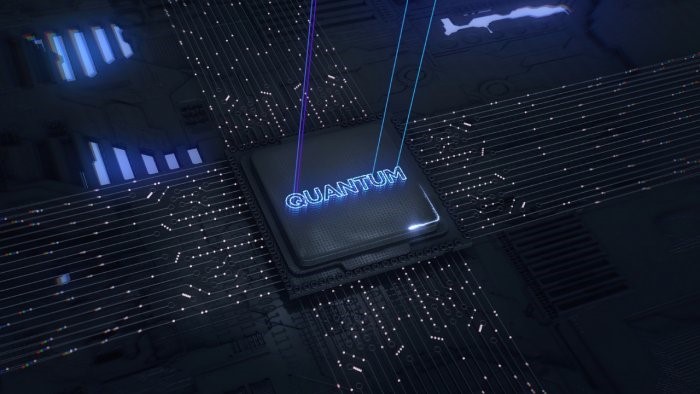
Disclaimer: Copyright infringement not intended.
Context
- The Union Cabinet approved the ₹6,003 crore National Quantum Mission (NQM).
What is Quantum Technology?
- Quantum technology is a field of physics and engineering that studies and applies the principles of quantum mechanics to the development of new technologies.
- Quantum mechanics is the branch of physics that describes the behavior of matter and energy at a microscopic scale, where the classical laws of physics do not apply.
- Quantum technology includes various types of technologies, such as quantum computing, quantum cryptography, and quantum sensing.
- While the classical computer is transistor-based, quantum computers are going to work on atoms.
- Quantum computers use quantum bits (qubits) instead of classical bits to perform calculations. The advantage of quantum computing is that it can solve problems much faster with more authenticity.
Quantum technology offers unique security
- Quantum technology offers unique security when it comes to encryption, making quantum communication hack-proof. Quantum communication is one of the safest ways of connecting two places with high levels of code and quantum cryptography that cannot be decrypted or broken by an external entity.
- If a hacker tries to crack the message in quantum communication, it changes its form in such a manner that would alert the sender and would cause the message to be altered or deleted.
Quantum Sensing
- Quantum sensing uses the principles of quantum mechanics to develop new types of sensors with unprecedented sensitivity and accuracy.
- These sensors can measure physical quantities, such as temperature, magnetic fields, and gravitational waves, with higher precision than classical sensors.
- This technology has vast utilisation in astronomy and astrophysics and in solving the riddles of the universe.

National Quantum Mission
About
- As part of the National Quantum Mission, four thematic hubs will be established in different institutions across the country to boost research and development in the field.
- Four thematic hubs (T-Hubs) will be set up in top academic and national research and development institutes on the domains –
-
- Quantum Computing,
- Quantum Communication,
- Quantum Sensing And Metrology, and
- Quantum Materials and devices.
- The hubs which will focus on generation of new knowledge through basic and applied research as well as promote R&D in areas that are mandated to them
Department
- The mission will be led by the Department of Science & Technology under a mission director.
Execution
- The Centre will form a mission secretariat which will have a governing body to steer the work under the leadership of scientists from the quantum field.
- The Mission Technology Research Council will work as a scientific advisory body for the governing body.
Mandate
- The center outlining the eight-year-long framework for the mission said that it will work at developing 20-50 qubit quantum computers and quantum communication over a distance of 2000 kilometers in the next three years.
- The new mission targets developing intermediate-scale quantum computers with 50-1000 physical qubits in eight years in various platforms like superconducting and photonic technology.
Note: For a perspective, the Indian achievement so far is limited to developing 2-3 qubits in a super-conducting platform.
Just like bits (1 and 0) are the basic units by which computers process information, ‘qubits’ or ‘quantum bits’ are the units of process by quantum computers.
Application
- As technology is evolving, understanding is evolving and so are the applications.
- In the area of therapeutics, healthcare, and security the use is being realized.
- The mission will help develop magnetometers with high sensitivity in atomic systems and atomic clocks for precision timing, communications and navigation.
- It will also support design and synthesis of quantum materials such as superconductors, novel semiconductor structures and topological materials for fabrication of quantum devices.
- Single photon sources/detectors, entangled photon sources will also be developed for quantum communications, sensing and metrological applications.
Other Deliverables of the mission:
- Satellite-based secure quantum communications between ground stations over a range of 2000 km within India.
- Long-distance secure quantum communications with other countries.
- Inter-city quantum key distribution over 2000 km as well as a multi-node quantum network with quantum memories are also some of the deliverables of the mission.

Significance
- The mission can take the technology development ecosystem in the country to a globally competitive level.
- India will be the seventh country to have a dedicated quantum mission after the US, Austria, Finland, France, Canada and China. The National Quantum Mission is going to give India a quantum jump in this arena.
- The mission would greatly benefit communication, health, financial and energy sectors as well as drug design, and space applications.
- Quantum Machine Learning can be leveraged for drug discovery and chemical simulations, Satellite placements, weather analysis and diffuse terrorist networks.
- Quantum sensing is a precise quantum hardware that can be used to sense earthquakes and other geological events.
- It will provide a huge boost to National priorities like Digital India, Make in India, Skill India and Stand-up India, Start-up India, Self-reliant India and Sustainable Development Goals (SDG).
In order to make India the hub of quantum, there must be a focus on imparting and improving education across all levels.
READ
QUANTUM COMPUTING:
https://www.iasgyan.in/daily-current-affairs/quantum-computing-38
https://www.iasgyan.in/blogs/quantum-computing
QUANTUM KEY DISTRIBUTION
https://www.iasgyan.in/daily-current-affairs/quantum-key-distribution
|
PRACTICE QUESTION
Q. National Quantum Mission will help India scale up scientific and industrial R&D and create a vibrant & innovative ecosystem in Quantum Technology.
|

https://www.businesstoday.in/technology/news/story/industry-applauds-cabinet-nod-for-rs-6000-crore-national-quantum-mission-378235-2023-04-20




